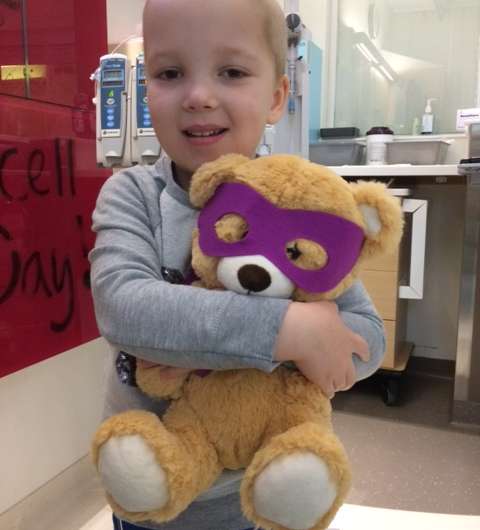How a teddy bear is helping in the battle against cancer

He may not be able to fly, or be as fast as the speed of light, but for children who have been diagnosed with cancer at Seattle Children's, the cuddly teddy bear who wears a mask and purple cape is still a super hero to them – he gives them strength. His name is T-Bear and he's bringing hope to children with cancer.
Meet T-Bear, He's more than just a teddy bear
Catherine Lindgren, director of the Therapeutic Cell Production Core (TCPC) and its' team at Seattle Children's Research Institute, had an idea to make a life-changing moment feel a little more personal for cancer patients undergoing immunotherapy, a new treatment that harnesses a patient's own immune system to seek and destroy cancer. Lindgren wanted every child to know they aren't alone – that they have a team of support around them. And so, T-Bear was born.
"Teddy bears are historically comforting to sick children," said Lindgren. "We wanted families to know we're on their team, and together, we're Strong Against Cancer."
The promising new treatment for patients with relapsed acute lymphoblastic leukemia (ALL), which has shown a 93% complete remission rate, starts with researchers taking T cells from the patient. The researchers then re-engineer the T cells within the TCPC at Seattle Children's Research Institute to recognize cancer cells. The next step – the most pivotal in the process for the researchers, patients and their families – is when the new and improved cancer fighting T cells are reinfused so they can go to work killing cancer wherever it may be hiding in the patient's body.
This is where T-Bear comes in – he accompanies the researchers when they hand deliver this vital therapy to the patient.
"It's more than just delivering medicine to a sick child," said Lindgren. "Delivering the T cells to our patients and families is always the best part of our day. Our scientists are incredibly invested in our patients and in their battle against cancer. We wanted each family to know we care about them. They are super heroes to us, and their T cells are super heroes too."
Not only does T-Bear help in the patient's celebration, but he's also a partner in their battle against cancer.
"Our hope is that the teddy bear will provide comfort while also acknowledging the tremendous milestone of receiving this groundbreaking therapy that could make a difference in their lives," Lindgren said. "We also hope that the teddy bear will help connect patients to the generous community of donors who support them and their therapy through Strong Against Cancer."
Hoping for a cure
For Sarah Cross, that moment had been a long time coming. When her daughter Erin, 6, relapsed with ALL last March in their hometown of Chester, England, the family was heartbroken.
"As parents, we just always hoped she wouldn't relapse, but just in case we were preparing a plan B," Cross said. "We did a lot of research and were following immunotherapy trials around the world closely. When she did relapse, we started applying for the trials in the U.S. because we had no other options left."
After finding the Pediatric Leukemia Adoptive Therapy (PLAT-02) trial at Seattle Children's, the family literally traveled across the world to find a cure.
"When we were accepted into the trial we were over the moon," said Cross. "There are no words to describe it. We hope so much that we've finally cured her leukemia for good."
On Aug. 30, Erin received an infusion of T cells. When the researchers came into the room with her T cells and T-Bear in hand, it was an overwhelming experience for the family.
"Of course, Erin didn't quite understand what was happening. She thinks she got Mr. T cells instead of super T cells," said Cross. "Receiving the bear was such a lovely personal touch. It took a lot of our anxiety away. Now, T-Bear sits at the end of her bed and keeps an eye on her."
After the infusion, Erin's new T cells went to work destroying her cancer. This week, she was able to leave the hospital and her family received life-changing news: she's in remission.
"We're so grateful," said Cross. "We've wanted so badly for her to get back to her normal life, cancer-free."
A special guest, a special gift
T-Bear is more than just a stuffed animal to kids at Seattle Children's, and so in honor of Childhood Cancer Awareness Month, Russell Wilson personally delivered a T-Bear to patients on the Cancer Unit, donated by Safeway. He wanted every child to feel comforted and special.
"These kids are strong. They are superheroes" said Wilson. "This Tuesday, we wanted to give them a superhero of their own."
Layla Beckstrand, 2, has been in and out of Seattle Children's since Oct. 29, 2015. She's at the hospital once a week every month receiving treatment for neuroblastoma.
When Wilson walked through the door of their hospital room, Layla and her mother Jessica Beckstrand had big smiles on their faces. Beckstrand was even dressed for the occasion. She wore a Seahawks t-shirt in support of her favorite team.
"I really appreciate him taking the time out of his day to see the kids," said Beckstrand. "It means a lot to have him visit us. He takes it personally."
More information: To purchase a T-Bear of your own and support revolutionary treatments that use the immune system to eliminate cancer, visit select Albertsons and Safeway stores in Wash. throughout September and a portion of the purchase price will be donated to Strong Against Cancer.














